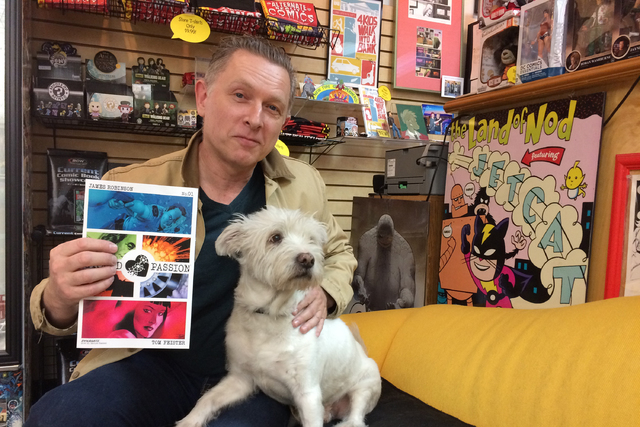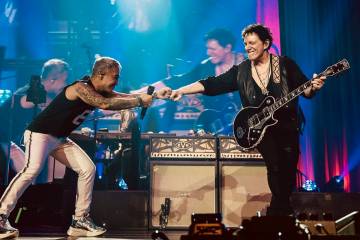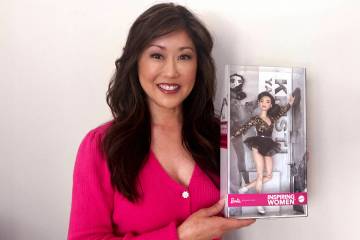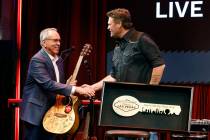British comic-book writer finds new adventures in Las Vegas
Vegas Voices is a weekly question-and-answer series featuring notable Las Vegans.
Comic-book heroes explore strange new worlds, and sometimes comic-book writers do too.
After a career spent mostly in Los Angeles and San Francisco, British writer James Robinson followed new wife Alyson to Las Vegas a year ago.
The comics veteran came to fame with his run on “Starman” in the ’90s. But he sometimes feels like a stranger in a strange land in his search for uni — a sea urchin spread for his bagel — or the Cheshire cheese named for his birthplace.
On the other hand, his trusty canine sidekick Rex has room to run in a midcentury modern house with a pool in the Huntridge neighborhood. Robinson also embraces the downtown scene, and a recent Saturday night found him “dancing my pants off” at The Dive Bar to The Velveteen Band, part of the “Geekapalooza” that followed the Vegas Valley Comic Book Festival.
The writer was part of a British invasion, led by Alan Moore (“Watchmen,” “V for Vendetta”), who brought what Robinson calls “a new sort of comic-book literacy, mixing everyday dialogue with all this super-heroic stuff, and not being ashamed of it. Embracing it, that’s the trick.”
In the semi-autobiographical “Airboy,” he injects himself into the narrative alongside the superhero to confront “the end of my last marriage, my unhappiness with myself, and my descent into drink and drugs.”
His recent take on The Avengers’ Scarlet Witch is now collected in paperback. And the first issue of his latest creator-owned original, “Grand Passion” — a “twisted love story” about a bank robber and a cop who fall in love at first sight while shooting at each other during a bloody heist — arrives in comics shops Wednesday.
January brings a new series about Felix Leiter, James Bond’s American friend who had to leave the CIA and become a private eye after losing limbs to sharks in “Live and Let Die”: “He’s the unluckiest man in the James Bond universe, but there’s a soulful introspection to him that very much feels like the private detective.”
Robinson discussed his twin dimensions in a chat that roamed from Alternative Reality Comics to the neighboring Dive Bar and back again.
Review-Journal: Comics have become such a decentralized industry, you literally could live anywhere. So why did you pick Las Vegas?
Robinson: I fell in love, which is what led me to move here. I met Alyson by chance in San Francisco, but she was back and forth between Las Vegas and Alaska. I was looking to get out of San Francisco because it’s changed so much. It really isn’t the town it’s been. It was always this lawless town, even in the first tech boom. There was no guarantees to it and a lot of culture, a lot of interesting stuff.
Now, properties are at a premium and the people coming in are like people that live in Brentwood: these boring people that have this overblown sense of self-importance. They don’t like cool little dive bars or music venues or secondhand bookstores or any of that stuff.
This place (The Dive Bar) is a nice honest place. This is the kind of place that in San Francisco, some yuppie couple would move in above it and then sue the place for keeping them awake and shut it down.
R-J: Obviously there are trade-offs involved, but do you think Las Vegas could be the next big place for an artist community that’s been priced out of San Francisco and other cities?
Robinson: I think artists don’t know how cheap it is here, relatively. An artist could do very well to move here. There’s a lot of space, a lot of freedom.
There are pros and cons to Vegas. I find the sprawl and the mini-mall aesthetic can sometimes be a little bit depressing. There seems to be a lot of drunk driving here. I got rear-ended by this guy who was (expletive)-faced at 3 in the afternoon. And they don’t just run the amber light. It is as red as red can be, not even just-turned red, and they go right through it. I’m constantly seeing debris and broken glass at intersections.
R-J: Growing up, could you ever imagine the day when comics would be so mainstream and appeal to so many adults? The comic-book movies making so much money and Comic-Con (the biggest fan gathering in San Diego) being on the cover of Entertainment Weekly?
Robinson: I can remember being in England and being aware of a stereotype of what a comic-book fan was. And he was not someone who lost his virginity at an early age. But in England, the hip nerd thing started a little earlier. You could read comics and have a girlfriend. You could read comics and go to rock shows. I remember feeling very lucky and fortunate about that.
A surprising number of women and girls are really into comics now. The hot punk rock girls who just want to find their own little comic-book nerd to date? Where were they when I was growing up?
R-J: It’s easy to understand the appeal of a creator-owned title like “Grand Passion.” It’s your baby and if it gets made into a movie or TV show like “The Walking Dead,” there’s a big payoff. But you’ve also worked on the big, dynastic characters like Fantastic Four, Superman and Batman, which you obviously don’t own. Is there more of a childhood awe, or pressure or responsibility when you write them?
Robinson: At this point in my career I don’t feel the pressure I might have felt 20 years ago, because I’ve been down that path a lot, taking over characters for a period of time. And then when you’re done, you’re done. Probably everything you’ve created will be undone by the next writer. Characters you loved with all your heart will probably be killed off.
Writers tend to not want to use other people’s characters. They just want to use them as fodder. That stuff is just part of the way things work. You have them for a while, and then you let go.
But we all grow up loving these characters. You end up working on these characters you don’t own and never will own, but there still is investment in them that’s very strong. People who could quite happily write stuff for (“The Walking Dead” publisher) Image and make a lot more money choose to still work for Marvel and DC because there’s still that love they build on.
R-J: You had a disappointing experience adapting Alan Moore’s “League of Extraordinary Gentlemen” into the movie screenplay. Is writing comics comparable to a comedian who acts in movies but then returns to stand-up because no one can interfere with the purity of that expression?
Robinson: (“League”) was originally a very good screenplay. Everything from 9/11 to too much producer involvement changed what was one story to a completely different story that wasn’t as good. It’s kind of heartbreaking to see what you’ve done get slowly changed. It isn’t like a sweeping change. It’s little pieces at a time.
But there literally is no other medium like comics. Writing a comic is basically like writing a screenplay while you’re storyboarding a film, and also editing the film at the same time.
The thing about comics is, as long as you have an accord with your artist, what you write and what’s on the finished page will be pretty close to what you imagined. Comics do not pay well compared to films or TV, but there’s a satisfaction at the end of it that it’s very close to what your vision is.
Read more from Mike Weatherford at reviewjournal.com. Contact him at mweatherford@reviewjournal.com and follow @Mikeweatherford on Twitter.
Getting to know: James Robinson
Favorite new music: "Everything You've Come to Expect" by The Last Shadow Puppets.
"It's a side project of Alex Turner from Arctic Monkeys and Miles Kane from The Rascals. It's rock meets a 1960s (James Bond film composer) John Barry spy movie thing. Because I had conventions and things, even though they were playing San Francisco and L.A. I ended up flying to Philadelphia to see them, because that was the only place that could fit into my schedule.
Food I could eat every day: Cheshire cheese
It's a British cheese that is actually quite hard to find in America. I was born in Cheshire, so I don't know if that affects my taste, but it is a gorgeous cheese that is somewhere between feta cheese and cheddar cheese. So it has a slightly saltier, tangier flavor. It's crumblier. It goes beautifully with tomatoes. My favorite thing in the whole world.
Favorite Book: "Treasure Island," by Robert Louis Stevenson
"The first adventure book I ever read, and the book that has stayed with me since I first read it. It really is a work that transcends age. You can read it as an adult and get a whole other sense of story from it. It's a book I go back to every few years."




























